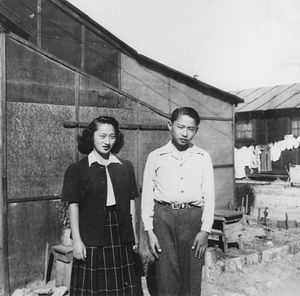LOS ANGELES — Los Angeles’ Little Tokyo has been kept mostly intact since the last time Washington planned to register a group of Americans.
Fugetsu-Do Sweet Shop — the community’s longest-running business at 113-years-old — still sells colorful mochi and other festive Japanese confections as it did when LA law enforcement posted signs on its street calling for Japanese Americans to register.
Around the corner is the edifice of the old Hompa Hongwanji Buddhist Temple, where many Japanese Americans left their possessions and lined up outside, tickets attached to their garments like livestock, waiting to be bused to Santa Anita and then to a series of remote internment camps in places like Manzanar, California.
At the Japanese American National Museum across the street from where authorities loaded the people onto those buses is a reconstitution of one of the dilapidated shacks that offered the internees — which included people like Star Trek’s George Takei — little shelter from the elements.
It’s here in Little Tokyo, at the Japanese American Community Center, that anti-Islamophobia organization Vigilant Love Coalition, Nikkei for Civil Right & Redress, and Nikkei Progressives will hold a vigil today to commemorate the 75th anniversary of the Japanese Imperial Navy’s surprise attack on Pearl Harbor in Hawaii.
In the immediate aftermath, then-U.S. President Franklin D. Roosevelt issued presidential proclamations allowing roundups of Japanese as well as German and Italian nationals. Months later, 120,000 Japanese — including American citizens of Japanese ancestry — were sent to internment camps.
The commemoration is an annual affair. Only this year, it’s not just a commemoration. It’s an expression of solidarity with and a pledge of support to American Muslims or more specifically “immigrants from Muslim countries,” whom the administration of President-elect Donald J. Trump has promised to register under the guise of national security. The practical use of the registry remains unclear.
Some community leaders are angry to see history repeating itself.
“We all should have learned the first time,” Brian Kito, Fugetsu-Do’s owner and a community rights and safety advocate, said. Kito’s parents, Roy and Kazuko, met and were married at the Heart Mountain, Wyoming internment camp. At the ceremony, his mother wore a dress shared by seven or eight women for such occasions, Kito said.
“I think Muslims have a lot of support from us,” Kito added.
The Japanese American National Museum issued a strongly worded statement on November 18 condemning the proposed Muslim registry, saying that the “creation of a registry for Muslim Americans in the future is to completely misunderstand one of the most shameful chapters in our nation’s history,” the Japanese-American interment.
This sort of advocacy is not new. Just after the September 11th attacks on the World Trade Center, amid rampant hate crimes that targeted anyone visibly or potentially Muslim, Japanese Americans contacted officials, issued condemnations and worked together with American Muslim advocacy groups to combat the onslaught of hatred.
“Japanese know that feeling” of being targeted, Kito said.
The museum features photos of Japanese American homes and businesses marked with scrawled epithets in the way that in the days after Trump’s election, assailants targeted mosques, homes, and businesses believed to belong to Muslims and other groups suddenly fearful for their futures.
One might feel secure in the number of Americans today who are more committed to the liberal principle of plurality than their parents or grandparents were during World War II. Still, in the run-up to internment, many non-Japanese Americans supported the Japanese community as well. A Los Angeles Times article argued, at the onset of the war, that Japanese immigrants were “good Americans, born and educated as such.”
But then came Pearl Harbor. Then it was a mix of “war hysteria, racism and a failure of political leadership” that led to internment, the museum’s Rick Noguchi, said.
There are, of course, great differences between anti-Muslim and anti-Japanese hatred, but not so many that American officials have not warned against a similar scenario.
In 2014, Antonin Scalia told a group of University of Hawaii law students of the Japanese American internment, “You are kidding yourself if you think the same thing will not happen again.”
It was a warning, issued before another seat opened in the nation’s highest court with Scalia’s passing.
“In times of war, the laws fall silent.”

































